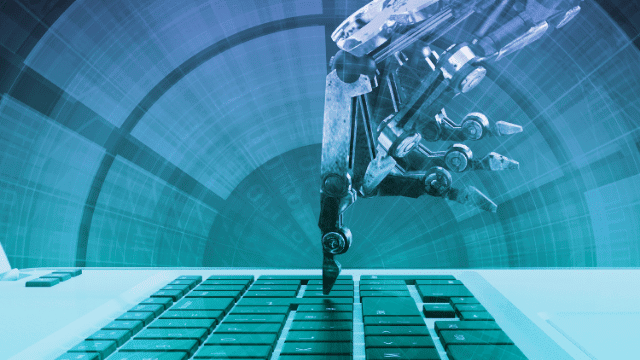Harnessing the power of AI
Harnessing the power of AI
Revolutionizing businesses:
In our fast-paced digital age, Artificial Intelligence (AI) has become a real game-changer for companies across multiple industries. By harnessing the power of AI, companies can reap numerous benefits, streamline operations, increase productivity, and drive innovation. From automating repetitive tasks to extracting valuable insights from vast amounts of data, artificial intelligence is changing the way companies work. Below, we'll explain the numerous benefits of integrating AI into businesses and how it's transforming industries around the world.
Greater efficiency and productivity
One of the most important benefits of AI in the enterprise landscape is its ability to automate tasks and processes, significantly increasing efficiency and productivity. AI-powered systems can take over repetitive and mundane tasks, freeing up human resources to focus on more complex and creative tasks. From chatbots that handle customer queries to intelligent systems that automate data analysis, AI enables companies to streamline operations, reduce errors, and increase overall productivity.
Data-based decisions
With the increasing volume of data, companies are inundated with huge amounts of information. Extracting meaningful insights from this data can be a daunting task. Artificial intelligence can help by analyzing complex data sets at lightning speed, identifying patterns and deriving actionable insights. By using AI algorithms, companies can make informed decisions based on accurate, real-time data, staying one step ahead of the competition, identifying market trends and personalizing the customer experience.
Personalized customer experiences
AI-powered technologies such as machine learning and natural language processing have revolutionized the customer experience. Chatbots and virtual assistants enable businesses to provide personalized and 24/7 customer support. AI algorithms can analyze customer behavior and preferences so businesses can offer customized recommendations and targeted marketing campaigns. By understanding individual customer needs, businesses can improve customer satisfaction, increase retention, and encourage brand loyalty.
Improved processes and cost savings
Adopting AI technologies can result in significant cost savings for companies. Automating manual tasks not only reduces errors but also eliminates the need for extensive human intervention, saving both time and money. AI-powered systems can optimize supply chain management, inventory control, and logistics, thereby reducing waste, optimizing delivery routes, and improving overall operational efficiency. In addition, AI algorithms can help with predictive maintenance to identify potential equipment failures, minimizing downtime and costly repairs.
Improved security on the Internet
With the rise in cyber threats, organizations need robust security measures to protect their sensitive data and infrastructure. AI plays a crucial role in strengthening cybersecurity. Machine learning algorithms can analyze massive amounts of data to detect anomalies and patterns that could indicate potential security breaches. With the help of AI, threats can be identified and addressed in real-time to minimize risks and protect corporate assets. By deploying AI-driven security solutions, organizations can proactively protect their digital assets from new cyber threats.
Innovation and competitive advantage
Artificial intelligence has the potential to drive innovation and give companies a competitive advantage. With the help of AI, companies can uncover hidden patterns, identify market trends, and make accurate predictions. These insights can drive product development, optimize business strategies, and help companies stay ahead of the competition. AI-powered recommendations can personalize the customer experience and increase customer satisfaction and loyalty. In addition, companies that embrace AI and innovate are more likely to attract top talent and foster a culture of continuous improvement.
Artificial intelligence has become a transformative force that is revolutionizing the way businesses operate. From increasing efficiency and productivity to data-driven decision making, AI offers a range of benefits to businesses across industries. By using AI technologies, they can streamline operations, personalize the customer experience, and gain a competitive advantage. The advancement of AI will shape the future of work and offer new perspectives for innovation. Using AI is no longer a luxury, but a necessity for businesses that want to succeed in the dynamic and evolving landscape of the digital age.
Understanding Artificial Intelligence
How it works and what it actually is:
Artificial intelligence (AI) has become an integral part of our lives. It is revolutionizing industries and changing the way we interact with technology. From virtual assistants to autonomous vehicles, AI has made remarkable progress. But what exactly is AI and how does it work? Below, we will delve into the intricacies of AI and explain how it is defined, what types there are and the mechanisms behind this groundbreaking technology.
The term Artificial Intelligence refers to the development of intelligent machines that can perform tasks that normally require human intelligence. These tasks include understanding natural language, recognizing visual patterns, solving complex problems, and making decisions based on data. AI systems aim to imitate human cognitive processes so that they can learn, think, and adapt to new situations.
Types of Artificial Intelligence
- Weak AI
Also known as "Narrow AI," it is designed to perform specific tasks with a high level of competence. Examples include voice assistants like Siri and Alexa that respond to voice commands, or recommendation systems that suggest products based on user preferences. Weak AI is very focused and works within predefined boundaries.
- Strong AI
General AI: General AI, often referred to as strong AI, has the ability to understand, learn and apply knowledge in various domains. It is capable of handling tasks that require human-level intelligence and has reasoning, problem-solving and decision-making skills. Strong AI is still a theoretical concept that has not yet been fully realized.
AI systems use various techniques and algorithms to simulate human intelligence. Here are some basic components and techniques used in AI development:
Machine Learning (ML)
Machine Learning (ML)
The two main types of ML are:
The two main types of ML are:
Supervised learning: In supervised learning, algorithms learn from labeled training data. They are given input data and corresponding output labels to make predictions or classifications when faced with new, as yet unknown data.
Unsupervised learning: Unsupervised learning is about recognizing patterns and relationships in unlabeled data. Algorithms group data points based on similarities or identify underlying structures in the data.
Deep Learning
Deep Learning
Deep learning is a subfield of ML inspired by the structure and function of the human brain's neural networks. Deep learning models, known as artificial neural networks (ANNs), consist of multiple layers of interconnected nodes called neurons. These networks can learn complex representations of data, making them suitable for tasks such as image recognition, natural language processing, and speech synthesis.
Natural language processing (NLP)
Natural language processing (NLP)
NLP focuses on enabling machines to understand, interpret, and generate human language. This includes techniques such as text analysis, sentiment analysis, language translation, and question answering systems. NLP algorithms use statistical models, linguistic rules, and deep learning methods to process text data and derive meaning from it.
Computer Vision
Computer Vision
Computer vision enables machines to perceive, interpret and understand visual information. By analyzing images or videos, computer vision algorithms can identify objects, recognize faces and even perform complex tasks such as autonomous driving. Deep learning techniques, such as convolutional neural networks (CNN), play an important role in computer vision applications.
Reinforcement Learning
Reinforcement Learning
Reinforcement learning involves training an agent to make decisions based on interactions with its environment. The agent receives rewards or punishments for its decisions, allowing it to learn through trial and error. This approach has proven effective in training AI systems for tasks such as gaming, robotics, and autonomous navigation
Conclusion
Artificial intelligence is a groundbreaking field that aims to replicate human intelligence and capabilities in machines. Through techniques such as machine learning, deep learning, natural language processing, and computer vision, AI systems gain the ability to learn, think, and solve complex problems. While AI has already made great strides in various areas, current research and advancements promise new ways to advance AI technology even further in the future. The advancement of AI has the potential to transform industries, augment human capabilities, and drive innovation in ways we can only begin to imagine.
In today's technology-driven world, Artificial Intelligence (AI) has become a transformative force that is revolutionizing the way businesses operate. By leveraging AI, companies can unlock a variety of opportunities to increase efficiency, improve decision-making, optimize processes, and drive innovation. In the following section, we explore how AI is being used in different business areas and show the practical applications and benefits it brings to businesses.
Optimized interactions with customers
Optimized interactions with customers
Improved data analysis and insights
Improved data analysis and insights
AI is revolutionizing the way companies analyze large amounts of data to gain meaningful insights. By using machine learning algorithms, companies can quickly process and analyze complex data sets and identify patterns, trends, and correlations. This allows them to make data-based decisions, optimize operations, and identify new opportunities. AI-powered analytics tools can uncover valuable insights into customer behavior, market trends, and operational efficiency, enabling companies to stay ahead of the competition and make informed strategic decisions.
Optimization of procedures and processes
Optimization of procedures and processes
The use of AI technologies is used to optimize various operational aspects in companies. In supply chain management, for example, AI algorithms can analyze historical data, market demand, and external factors to optimize inventory levels, predict demand fluctuations, and improve logistics efficiency. AI-powered predictive maintenance can identify patterns in asset performance to enable proactive maintenance, reduce downtime, and optimize resource allocation. In addition, AI-driven algorithms can automate repetitive tasks, freeing up human resources to focus on higher-value activities, resulting in increased productivity and cost savings.
Personalized marketing and sales
Personalized marketing and sales
Artificial intelligence is changing the way companies approach marketing and sales strategies. By analyzing large amounts of customer data, AI algorithms can segment customers based on preferences, behaviors, and demographics. This allows companies to offer personalized marketing campaigns, tailored recommendations, and targeted advertising. AI-powered recommendations can suggest relevant products or services to customers, improving the overall customer experience and increasing conversion rates. In addition, AI can help sales teams by analyzing customer interactions, predicting buying patterns, and providing sales reps with valuable insights to improve their strategies and achieve better sales results.
Expansion of decision-making processes
Expansion of decision-making processes
Artificial intelligence improves business decision-making by providing data-driven insights and forecasts. AI-powered algorithms can analyze large-scale data sets, historical trends, market conditions, and external factors to create accurate forecasts and predictions. This helps companies make informed decisions about product development, pricing strategies, market expansion, risk assessment, and resource allocation. AI also enables scenario modeling and simulations that help companies evaluate different strategies and possible outcomes before implementing them.
Strengthening cybersecurity measures
Strengthening cybersecurity measures
In times of increasing cyber threats, AI plays a crucial role in strengthening cybersecurity measures. AI-powered systems can detect and respond to security breaches in real time by analyzing large amounts of data and identifying abnormal activities and patterns that indicate potential threats. AI algorithms can learn and adapt to new attack vectors, allowing organizations to stay one step ahead of cybercriminals. By using AI in cybersecurity, organizations can strengthen their defenses, protect sensitive data, and mitigate risks.
Conclusion
Artificial intelligence is changing the way businesses operate in a wide range of areas. From customer interactions and data analytics to optimizing operations and personalized marketing, AI offers a wide range of benefits to businesses. By using AI technologies, companies can streamline processes, improve decision-making, enhance the customer experience, and gain a competitive advantage in the market. The continued development of AI will undoubtedly shape the future of business and pave the way for greater efficiency, innovation, and growth.

Integration
Integration
We integrate your existing systems into an intelligent environment, with central process logic as well as digital communication.

Automation
Automation
With automation, you can automate your digital processes and thus save time and money.

Data
Data
We love data and guide our clients all the way along their enterprise-wide data strategy.

Digitalization
Digitalization
We integrate your existing systems into an intelligent environment with central process logic and digital communication.

Trainings
Trainings
Trainings for your success. We are an official partner of QlikTech when it comes to consulting, licences or training.

Support
Support
Competent and direct. Our support helps you promptly when you need help. Online or directly in a remote call.

